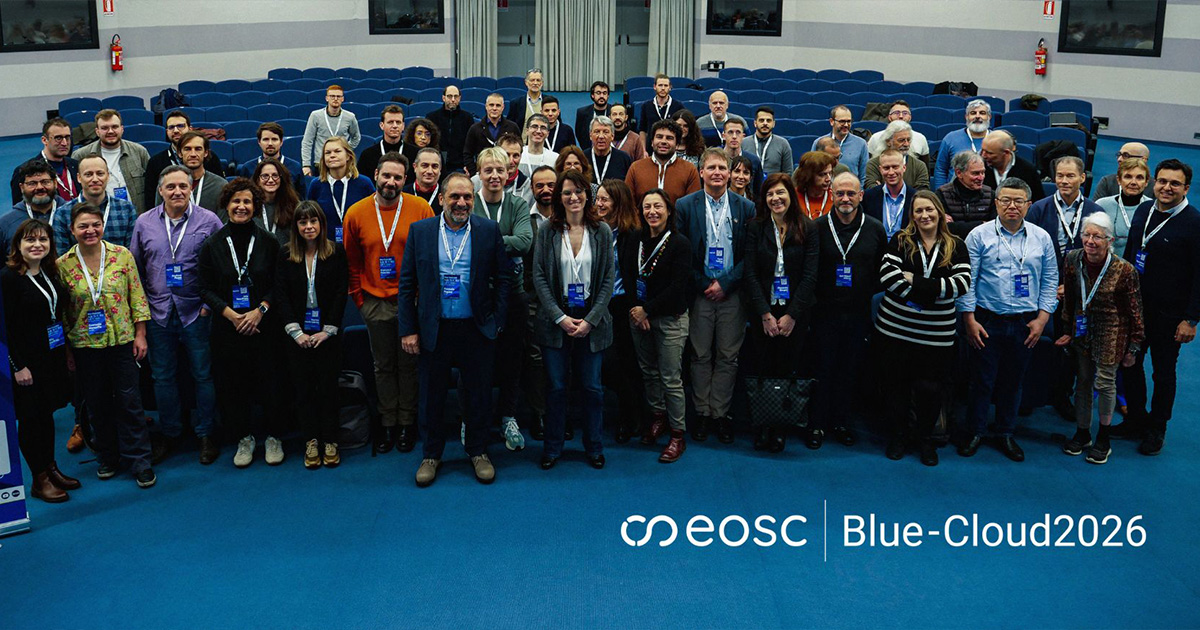The Horizon Europe project Blue-Cloud 2026 kicked off in Pisa, Italy, paving the way for the development of a federated European ecosystem to deliver FAIR & Open Science datasets, applications, and computing resources instrumental for the EU Mission “Restore Our Ocean and Waters by 2030”.
Over the past decades, Europe developed an impressive capability for aquatic environmental observation, data-handling and sharing, modeling, and forecasting, second to none in the world. This builds upon national environmental observation and monitoring networks and programs, complemented with EU infrastructures such as the Copernicus satellite observation program and related thematic services, the European Marine Observation and Data Network (EMODnet), as well as a range of environmental European Research Infrastructures and major R&D projects.
Within this framework, since October 2019, the pilot Blue-Cloud project (www.blue-cloud.org) combined both the interests of the European Open Science Cloud (EOSC), aiming to provide a virtual environment with open and seamless access to services for storage, management, analysis, and re-use of research data, across borders and disciplines, and the blue research communities by developing a collaborative web-based environment providing simplified access to an unprecedented wealth of multidisciplinary datasets from observations, analytical services, and computing facilities essential for blue science.
Funded by the Horizon Europe program, Blue-Cloud 2026 aims at a further evolution of this pilot ecosystem into a Federated European Ecosystem to deliver FAIR & Open data and analytical services instrumental for deepening research of oceans, EU seas, coastal & inland waters. It develops a thematic marine extension to EOSC for open web-based science in support of the EU Green Deal, UN Sustainable Development Goals, the EU Destination Earth initiative, and the EU Mission “Restore Our Ocean and Waters by 2030”.
A key Link for EOSC and the Digital Twin of the Ocean
Over the course of 42 months starting in January 2023, the consortium is going to integrate more blue analytical services in the Blue-Cloud Virtual Research Environment, configure new thematic Virtual Labs, improving services for uptake of new data sets from a multitude of data originators and major e-infrastructures, and for discovery and access to their structured data collections.
Pasquale Pagano, CNR-ISTI, Blue-Cloud Scientific and Administrative Coordinator, said: “The current Blue-Cloud technical framework is extensible and open by design, constantly evolving according to the needs of the community, facilitating collaborative research and the uptake of Open Science principles.”
In particular, the consortium is going to develop, test, validate, and document new Blue-Cloud analytical Big Data WorkBenches generating harmonized and validated data collections of Essential Ocean Variables (EOVs) in physics (temperature and salinity), chemistry (nutrients, chlorophyll, oxygen) and biology (plankton taxonomy, functions, and biomass). Such EOV collections are highly relevant for analyzing the state of the environment. Resulting Workbenches are destined to be adopted by EMODnet and CMEMS for producing these EOV collections at regular intervals. This way, Blue-Cloud 2026 will provide a core data service for the Digital Twin of the Ocean that will use the EOV collections for analyzing the state of the environment and forecasting both its evolution and possible impacts of measures.
Dick Schaap, MARIS, Blue-Cloud Technical Coordinator, said: “In Blue-Cloud, we demonstrated the feasibility of data federation across different infrastructures, overcoming technical challenges. We have also confirmed that the marine research community is interested in further exploring and exploiting this potential, which is exactly what we are going to do in Blue-Cloud 2026, paving the way for other communities in EOSC.”
The existing Blue-Cloud framework is already home to one of the most mature communities in EOSC and can provide practical examples to younger communities on a variety of aspects ranging from interoperability to data federation, from FAIR practices to cross-domain interaction.
Sara Pittonet Gaiarin, Trust-IT Services, Blue-Cloud 2026 Project Coordinator, adds: “The Mission of Blue-Cloud 2026 is to become the marine thematic EOSC, implementing Open Science across the entire research value chain, from data management to software development and scientific applications. It positions itself at the cornerstones of fundamental strategies for the European Union: the European Data Strategy, the Open Science Policy, the Green Deal, and the EU response to the UN SDGs zero hunger, climate action and life below water.”
Blue-Cloud 2026 is co-coordinated by CNR and Trust-IT Services, with MARIS as technical coordinator, counting on a core team of partners such as VLIZ, Ifremer, Mercator Ocean International, and Seascape Belgium. Overall, it mobilizes a solid, multidisciplinary, committed team of 40 partners across 13 EU countries. The three-day kick-off meeting in Pisa, Italy, was hosted by CNR (National Research Council of Italy) in collaboration with Trust-IT and provided the first official opportunity for the consortium to meet in person, take stock of the work performed in the pilot project and plan the key upcoming activities towards a successful implementation of the Blue-Cloud framework by 2026.



